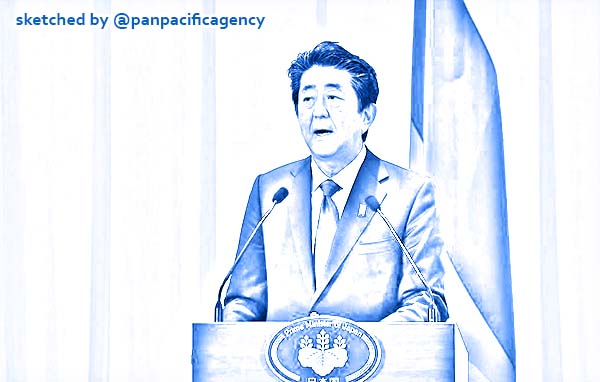Abe’s legacy seen as hinging on holding delayed Tokyo Olympics

Japan's Prime Minister Shinzo Abe speaks during a news conference with Russia's President Vladimir Putin after the G20 Summit in Osaka, Japan June 29, 2019. Yuri Kadobnov/Pool via REUTERS. Sketched by the Pan Pacific Agency.
TOKYO, Jul 26, 2020, Jiji. Prime Minister Shinzo Abe’s fate is seen depending on whether the Tokyo Olympics and Paralympics will be successfully held next summer following the one-year postponement caused by the COVID-19 pandemic, The Japan Times reported.
The Abe administration is keen to hold the games by simplifying the event and making other changes to account for the novel coronavirus, although the economic benefits of the event are likely to be smaller than initially projected.
The cancellation of the Summer Games could have devastating impact on the administration, as Abe, whose term as president of the ruling Liberal Democratic Party is slated to end in September 2021, hopes to make them a legacy of his tenure as Japan’s longsest-serving prime minister.
“If the Olympics and Paralympics are canceled, the administration would become a lame duck,” a senior LDP member said.
“I want to create momentum for Japan to rise in the world again,” Abe stressed in an online show last month. He mentioned the 1964 Tokyo Olympics, which became a symbol of Japan’s rapid economic growth after the war.
However, there is a sense of crisis within the administration, with no end in sight to the coronavirus epidemic.
When the postponement of the 2020 Games was decided in March, Abe clarified his determination to hold them a year later “in complete form.” Desperate to avoid cancellation, however, the leader has since changed this stance, allowing the Olympics to be held in a simpler form.
Behind the prime minister’s change of stance was Yoshiro Mori, head of the Tokyo 2020 organizing committee. In mid-June, the former prime minister warned in a phone call with a government official that the games “could be canceled at this rate.”
Mori then suggested his intention to present “various options” to the International Olympic Committee as a backstop, according to informed sources.
With tourism virtually at a halt because of the pandemic, it seems inevitable that the economic impact of the Olympics will be subdued.
Still, an LDP executive close to Abe claimed the games “should definitely take place, even without spectators.”
“It’s impossible to completely eradicate the coronavirus and hold the Tokyo Games,” said a senior government official. “We aim to manage the Olympics while coexisting with the coronavirus.”
The participants for the opening ceremony “may be limited to one representative from each country or region,” the official added.
At the same time, many think Japan should cancel the Olympics. “The Olympics will be unable to take place,” a veteran LDP politician predicted.
While the final decision on whether to hold the Tokyo Games in summer 2021 is expected to be made around March, momentum toward its cancellation may rapidly build after another coronavirus crisis or a delay in vaccine development, observers said.
Within the government and ruling bloc, there is a view that if cancellation appears inevitable, Abe could dissolve the House of Representatives to call a snap election before the final decision is made.
“I think a Lower House breakup is possible within this year,” a former Cabinet minister said, suggesting an election win could allow Abe to keep his grip on power even if the games are canceled.
Meanwhile, a government source said the Cabinet “may as well resign en masse if the Olympics can’t take place.”
It would be “so miserable for the administration to continue” after missing the goal of holding the Tokyo Games, the source said.